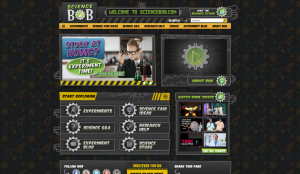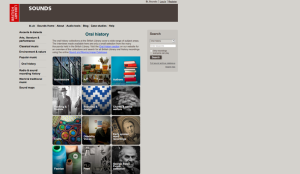General Interest
Back to Top
|
 |
|
OpenStreetMap Haiku
|
Language Arts |
|
A haiku for you / Latitude and longitude / Place-based poems here. Poetry enthusiasts looking for a fun new way to find haikus may enjoy OpenStreetMap Haiku, a resource that "automated making haikus about places." The project "look[s] at every aspect of the surroundings of a point," to create poems that are "fun, often weird," but nonetheless always engaging. To generate a poem about a location of choice, users can scroll through the world map, select a location, and wait patiently for their very own 5/7/5 stanza to appear. From Little Rock, Arkansas ("Rest in peace / feeling good in Arkansas / Good morning") to Bahia, Brazil ("Can you hear the seagulls? / The day going by / A dark rain,") the site offers world-wide wit. Haikus can be generated in English, Spanish, French, and Czech. Users curious about the programming used to create the Haiku Map should check out the About page (following the link in the lower left-hand corner of the site's home page), which provides a detailed walk-through of the software and coding involved in creating the database on OpenStreetMap. [EMB] |
|





|
|
 |
|
USGS: Wetland and Aquatic Research Center
|
Science |
|
Readers interested in the natural sciences may like to explore the online home of the United States Geological Survey's Wetland and Aquatic Research Center (WARC). Based in the southeastern U.S., WARC was formed in 2015 through the merger of two science centers, the National Wetlands Research Center in Louisiana and the Southeast Ecological Science Center in Florida. Here, readers can access a vast array of information about WARC's work with wetlands and coastal ecosystems. While the main page highlights the Center's most recent news and publications, visitors can navigate WARC's website via the menu on the left to examine it further. A good place for all visitors to start is the Science section, which provides an overview of WARC's work and is organized into themes such as Species Biology, Priority Landscapes, and Invasive Species. Choosing a theme leads to summaries of WARC's relevant research projects and links to each project's scientific publications. Visitors can also browse the Data and Tools section, where they will find more than 1,000 scientific datasets, APIs, and other resources available to download. Under Publications, readers will find WARC's more than 2,200 scientific articles, reports, books, and other publications, many of which can be downloaded for free. [AL] |
|





|
|
 |
|
Photographing Freetowns: African American Kentucky through the Lens of Helen Balfour Morrison, 1935-1946
|
Arts |
|
Between 1935 and 1946, Helen Balfour Morrison went on at least three photography expeditions from Chicago's North Shore to the Inner Bluegrass region of Kentucky, where she photographed African Americans living in rural freetowns or hamlets in the area. Her photographs and personal papers were donated to the Newberry Library in 2016 and are encapsulated in the online exhibition Photographing Freetowns: African American Kentucky through the Lens of Helen Balfour Morrison. Visitors will want to begin by reading the exhibition's introduction, which speculates about the reasons behind Morrison's choice of subjects. Was she "engaging in a common rite of passage for artists in the era?" Was she trying to "romanticize life in the segregated South?" Some of her photography titles, such as "Masters Got Company" and "Looking Over the Old Plantation," suggest the latter. The web exhibition includes sections with biographical information about Morrison and the Bluegrass region of Kentucky as well as the photography collection, categorized in sections such as Sugar Hill, Zion Hill, or Working Women. Readers can jump to the Browse Images section to see all of the 100 or so images in the exhibition, as well as letters, documents, maps and postcards. [DS] |
|





|
|
 |
|
California Community Colleges: Online Student Readiness Tutorials
|
Science |
|
Online learning is a growing field, providing unique opportunities and requiring unique preparation. Set yourself up for success in an online learning environment with these Online Student Readiness Tutorials. Under Interactive Tutorials, users will find a collection of lessons and tips (all under 15 minutes in length) that cover a range of topics relevant to online learners, from "Getting Tech Ready" to "Financial Planning." These tutorials can be accessed in three formats: multimedia presentations, text scripts, or audio recordings. Under Interactive Tools, readers will find four personalized tools that demonstrate the benefits of online learning and further prepare students for this unique educational environment. For example, the Computer Readiness Test ensures that your computer is up-to-date with the proper technology and plug-ins to make your online learning experience go smoothly. The Daily Schedule Calculator helps students devise a schedule that makes time for various commitments (such as class, studying, sleep, exercise, and working). The tool updates in real time, allowing individuals to adjust, plan, and prioritize their time. These resources are curated by California Community Colleges Online Education Initiative, dedicated to providing "interactive, helpful, and easily accessible," tools for online students. Readers should note that their user experience will be best when the resources are accessed on a computer or tablet, rather than a phone. [EMB] |
|





|
|
 |
|
Science Bob
|
Science |
|
Whether you're looking for science fair inspiration or assistance with your research, Science Bob ("teacher, author, maker, and presenter" Bob Pflugfelder) has you covered. His site encourages users to delve into the world of science. From hovercrafts to homemade ice cream, the Experiments section provides "a list of great science experiments with instructions that you can do right at home or at school." Young scientists looking for a burst of inspiration may want to check out the Science Fair Ideas section to find a list of possible science fair topics, including: "Does the color of a room affect human behavior?" and "Does having worms in soil help plants grow faster?" On the Science Q&A page, life's burning questions are addressed, from converting temperatures between Farenheight and Celcius, to why the sky is blue, to what differentiates moths from butterflies. Looking for an answer to a question that is unavailable on the site? The "Still Need an Answer?" button at the bottom-right of the page welcomes user submissions. The Videos and Experiments Blog pages provide additional content from Science Bob. If your science wonder is still not satisfied, the Research Help page links to various other resources and websites, divided into six different themes including, for example, Space/Planets and Animals/Nature. [EMB] |
|





|
|

















